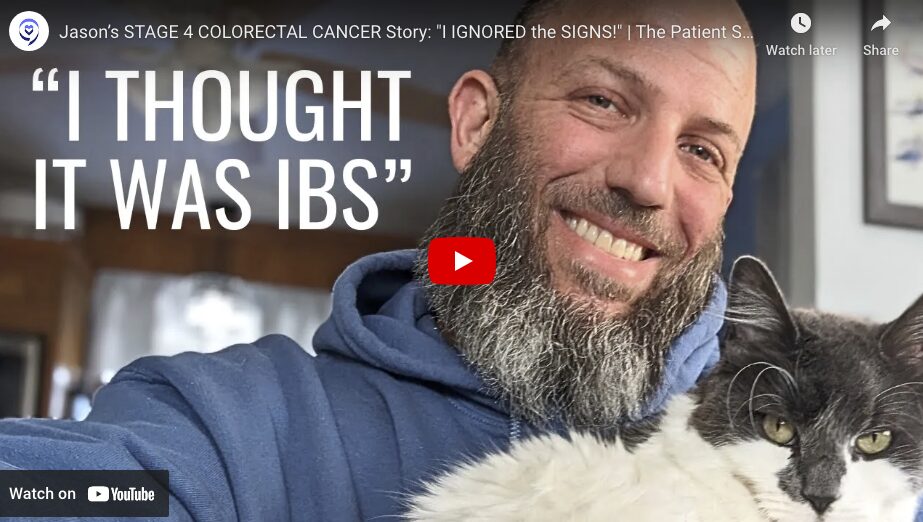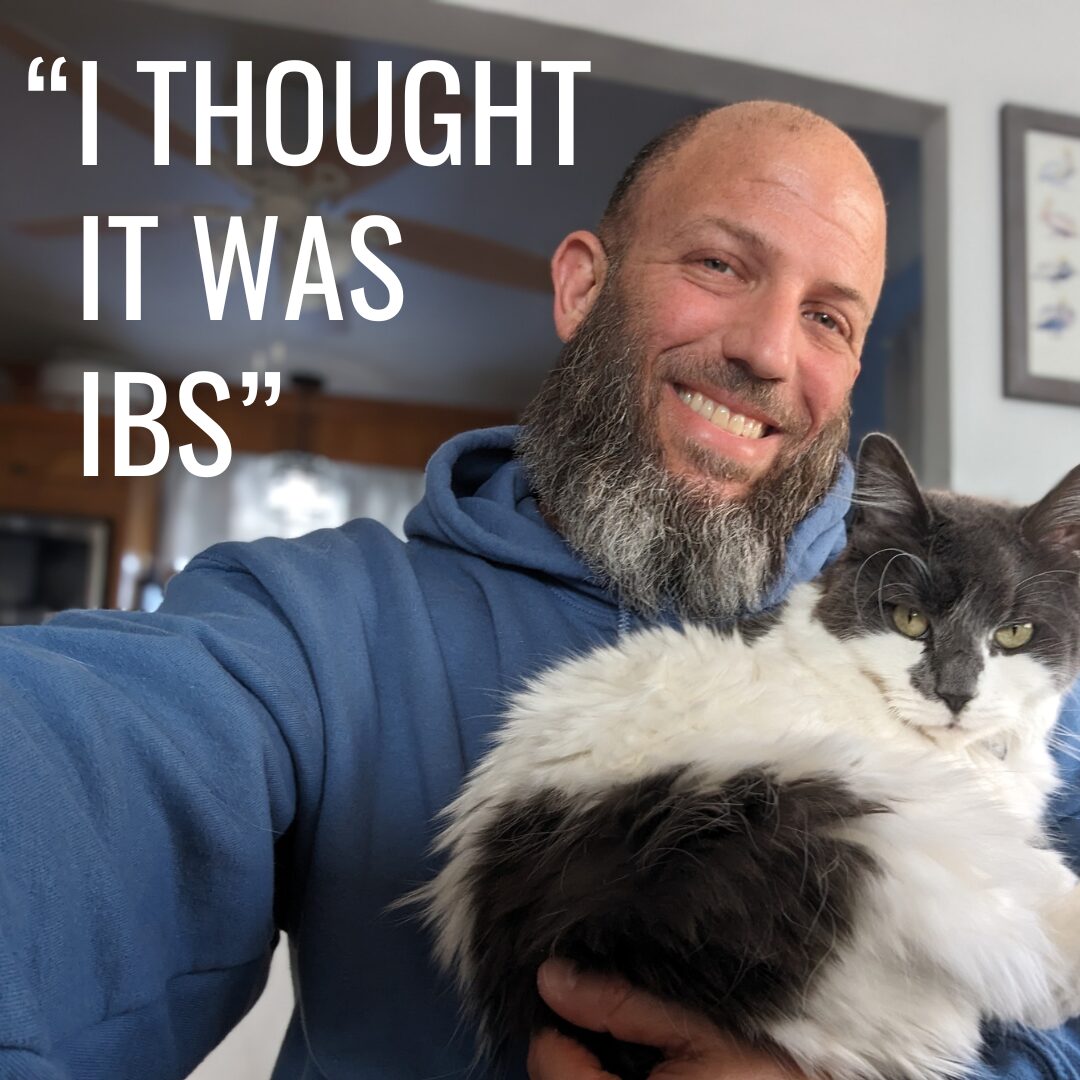Understanding IBS, IBD, and Colorectal Cancer Symptoms
Digestive issues can be unsettling, embarrassing, and confusing, especially when trying to discern between IBD versus colon cancer symptoms. IBS, IBD, and colorectal cancer symptoms can be similar, making it hard to know what’s happening inside your body. Learn more below and through our patient stories to help you find the right guidance and care.
Remember, use this information for educational purposes only, and do not let it replace professional medical advice.
Irritable Bowel Syndrome (IBS)
IBS describes a functional disorder affecting the large intestine, causing discomfort and irregular bowel patterns. While the exact cause remains elusive, potential contributors include:
- Increased gut sensitivity: Some individuals experience heightened sensitivity to specific foods, stress, or other triggers, leading to discomfort.
- Gut-brain connection mixup: Communication between the gut and brain can become imbalanced, contributing to digestive issues.
- Microbiome imbalances: Shifts in the good bacteria living in your gut might play a role in IBS development.
IBS Symptoms
- Main symptoms: Abdominal pain, bloating, gas, diarrhea and/or constipation (they can alternate)
- Other possible symptoms: Mucus in stool, feeling like you haven’t fully emptied your bowels, urgency to go, nausea
- Not typical: Bloody stools, weight loss, persistent fever
Inflammatory Bowel Disease (IBD)
IBD encompasses chronic inflammatory conditions affecting the digestive tract, causing inflammation that can damage tissues. While the precise cause remains unknown, genetics, immune system factors, and environmental triggers contribute to its development. The two main types are ulcerative colitis and Crohn’s disease.
- Ulcerative colitis is a condition that causes inflammation in the colon. This inflammation leads to symptoms such as diarrhea, urgency, and occasionally bloody stools.
- Crohn’s disease is an inflammation that can affect the digestive tract, causing pain, bloating, diarrhea, and malnutrition.
IBD Symptoms – Main symptoms (varies depending on type):
- Ulcerative colitis: Diarrhea, urgency, bloody stools, abdominal pain
- Crohn’s disease: Abdominal pain, diarrhea, urgency, weight loss, fatigue, malnutrition
- Other possible symptoms: Fever, joint pain, skin problems
- Not typical: Always bloody stools (except ulcerative colitis)

Initially dismissed as stress, Meghan’s symptoms of persistent diarrhea, blood in the stool, and severe stomach pain led to a Crohn’s disease diagnosis. Years later, a colonoscopy revealed precancerous tissue, leading to a permanent ileostomy.
This overlap in symptoms between IBD and colorectal cancer underscores the importance of thorough medical evaluation and early diagnosis.
Colorectal Cancer: A Critical Distinction
Unlike IBS and IBD, which primarily affect the function or inflammation of the colon, colorectal cancer arises differently. This problem occurs when there is an excessive growth of abnormal cells in the colon or rectum. These abnormal cells form polyps or tumors, which have the potential to develop into cancer.
IBS and IBD don’t lead to colorectal cancer directly, even though they may have similar bowel symptoms. However, they may raise your chances of getting it in the future. Finding colorectal cancer early is important for successful treatment. Regular screenings are especially important for people at higher risk. If you’re reading this article because you want to understand symptoms related to IBD versus colon cancer, consider the above two conditions when reading the below.
Potential warning signs include:
- Blood in the stool (bright red or dark)
- Persistent changes in bowel habits (diarrhea, constipation, or narrower stools)
- Unexplained abdominal pain or cramping
- Unexplained weight loss
- Or no symptoms at all, making regular screening essential for early detection
Next Steps to Understanding Your Symptoms
1. Discuss your symptoms with your doctor.
Be prepared to answer questions about your:
- Symptoms: Frequency, severity, duration, and any triggering factors.
- Medical history: Past diagnoses, surgeries, and medications.
- Family history: Presence of IBS, IBD, or colorectal cancer in close relatives.
- Lifestyle habits: Smoking, alcohol consumption, and dietary choices.
2. Based on your doctor’s assessment, you may undergo testing.
- Blood tests: To assess inflammation and other markers.
- Stool tests: Looking for blood or other abnormalities.
- Imaging tests: X-rays, CT scans, or a colonoscopy to better see what is going on inside.
Patients describe their colorectal cancer symptoms
Remember, you are not alone in this journey. Get help from a medical professional. The stories on our site are proof that there is a community of survivors telling their stories to help others.
Learn about Jason’s colorectal cancer symptoms that he explained away as IBS and how they got worse, sending him to the doctor to discover he had Stage 4 colorectal cancer.

I probably ignored the real symptoms for a long time and explained those away by my poor diet because I didn’t have a great diet…I struggled with my gut for a very long time. I thought it was IBS. I’m busy.
Jason, Stage 4 Colon Cancer – read his story to learn more.
Explore the full catalog of colorectal cancer stories from our community of patients and thrivers who share their experiences with colon and rectal cancer diagnoses and treatments.

Take our survey and get 10 Tips from Our Community on SYMPTOMS, diagnosis, treatments, and support.
